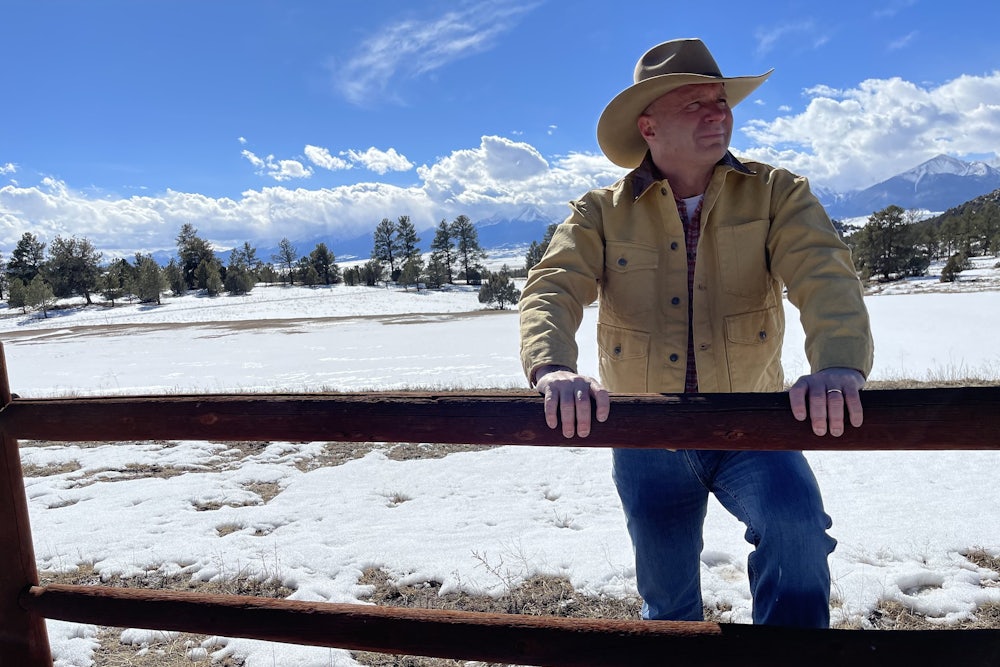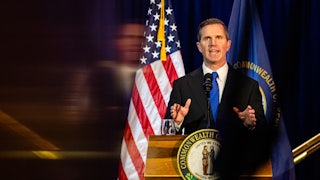Marcus Flowers may be the most mysterious person in American politics. On January 18, which was also his last day working for the Defense Department in a position he refuses to disclose, the career soldier and defense contractor emerged from obscurity with a viral tweet, posting a video of himself scraping a Confederate flag sticker off a power transformer box in the town of Bremen, Georgia. “#NotInMyTown #NotInMyDistrit” [sic], the tweet read.
In March, Flowers made it official: He would be running in the Democratic primary for Marjorie Taylor Greene’s seat in Congress. Announcing his run with a splashy video and changing his handle to @Marcus4Georgia, Flowers promised to use his experience fighting terrorists to take on seditionists at home. The link could not be clearer: The threat posed by people like Marjorie Taylor Greene was analogous to—or perhaps even greater than—the danger posed by the foreign terrorists that Flowers had spent decades fighting.
Around the same time, some 1,500 miles away in Colorado’s 3rd Congressional District, another veteran with a murky background in global hotspots announced his play for the seat of another one of the new GOP radicals. Gregg Smith, a former Marine, finance executive, and business associate of Blackwater founder Erik Prince, tweeted an action-packed campaign video announcing his Democratic candidacy that bragged about his experiences as a Marine under fire in Beirut and in lower Manhattan on 9/11, when he helped ferry survivors to safety. “I signed up to defend this country,” said Smith. “My opponent Lauren Boebert signed up to destroy it. Together we will remove her from Congress.”
While the particulars differed from those in Flowers’s video—Smith took pains to note that during his tenure as the CEO of Frontier Services Group, he blew the whistle on the nefarious behavior of Prince, the company’s chairman—the tone of the two political aspirants’ message was nearly identical: Here comes a new breed of tough-guy Democrat, ready to use their hard-won national security experience to fight ersatz “terrorist sympathizers” here at home.
Flowers and Smith represent an unusual type of Democratic political hopeful. Both are political novices. Flowers said that while he tilted Democrat, he was “apolitical” while working in government and contracting. Smith voted Republican for 35 years—“until Donald Trump came down the escalator,” he said in a recent interview. Both have significant national security bona fides and experience in war zones that—depending on one’s view—are either their greatest asset or their most glaring liability. From interviews and their own statements, it’s clear that both men are partial to the former interpretation. Sounding notes of patriotism, proud to fight the new QAnon menace infiltrating Congress, they are a novel force in the Democratic Party, representing a jingoistic turn that they say will help them win heavily Republican districts. If they’re right, they might just reinvent what it means to be a Democrat in the Q era.
Gregg Smith grew up in southern Michigan and joined the Marines in 1980, straight out of high school. Deployed to Beirut in the wake of the 1983 embassy bombing, he participated in firefights while defending the airport. Later, he would earn degrees from Michigan State University and the University of Michigan. In 1997, he was working as an investment banker in Detroit when he met the scion of a wealthy Michigan family, a recently retired Navy SEAL named Erik Prince.
Prince invited Smith to North Carolina, where the former SEAL had built a training facility on a large plot of land. “It wasn’t anything like it ended up being,” said Smith. “It was a couple thousand acres, but it was just five or six ranges. I used to go down there early on. Erik was happy if he could get a SEAL team out there to use the facility and pay him a couple thousand dollars. It was way different.”
Smith and Prince began a business relationship that lasted almost 20 years. Prince would occasionally call Smith, who later moved on to run Deloitte’s corporate finance practice in lower Manhattan, and ask for advice, for which he paid Smith. In 2010, after what Smith referred to as “the Nisour Square debacle,” he helped Prince broker the sale of Blackwater to a group of investors. In 2013, Smith and Prince established a closer business relationship, starting a pan-African logistics company called Frontier Services Group, or FSG, with $110 million in startup capital from a Hong Kong firm.
“It was obviously Erik’s name that we were bartering about in Hong Kong and China,” said Smith. “They thought he was a famous mercenary.”
FSG was supposed to be a legitimate logistics and transportation company, leveraging Prince’s experience and connections to operate in rough areas without delving into actual soldier-for-hire work. “I only agreed to ever do business with Erik Prince in a public company,” Smith told The New Republic, emphasizing that he wanted oversight and transparency. (Prince didn’t respond to requests for comment.)
But things eventually went sideways, when it became clear that Prince was making other deals for what was, in fact, mercenary work. “I think I began to have doubts pretty much from the get-go when I started to look at what we were doing in South Sudan,” said Smith. In an interview with the independent journalist Zev Shalev, Smith said, “I’m not sure all the work we were doing was legitimate.” Prince brokered the Sudan contract personally with the country’s Ministry of Petroleum, without involving any company lawyers or officials. “That was just unusual,” Smith told me.
In 2015, Smith realized the severity of the problem when he learned that Prince had outfitted surveillance and reconnaissance aircraft with weapons in an Austrian factory, in which Prince was also invested. This is the realization that led Smith to report Prince’s conduct to FSG’s board and resign from the firm. Admiral William Fallon, the former head of U.S. Central Command and another board member, also resigned in solidarity with Smith. (Smith said that he and Fallon remain friends.)
But Smith wasn’t quite done with Prince. Although he said he last talked to his former company chairman in March 2016, Smith would go on to become a source for journalists writing about the notorious mercenary and for federal investigators. “I’ve talked to authorities and given them everything I have that would possibly be of interest to them,” he said.
On a Twitter account called @10milesbadroad, Smith would “send up an occasional flare” if he thought journalists weren’t adequately reporting on Prince’s contacts with the Trump administration. (I first learned of Smith during the summer of 2020, when I saw him tweeting about Prince from this account.) Smith, who identified himself on the @10milesbadroad account by his own name, later scrubbed all of its tweets, except for one: In February, when The New York Times reported on a United Nations investigation into Prince’s activities in Libya, Smith posted a link to the article, in which he was quoted, and the words, “The truth will prevail.” Later, after I asked him about the account, Smith deleted it entirely.
Smith understands that Prince and Blackwater will follow him into his political career; he nevertheless maintains that it’s all in his past. “People are going to ask, ‘Well, what the hell were you doing with Erik?’” he said. “I don’t have any interest in Erik Prince at this point. I hope that whatever he’s been doing is legal, and if it’s not legal, I hope he is reckoned with. But beyond that, I don’t really give a fuck about the guy.”
During the Trump administration, Smith said, he learned that there was an “active investigation” into Prince that, he believes, was shut down by then–Attorney General Bill Barr. “I believed that was inappropriate,” Smith said. He also harbored fears that Trump would pardon Prince and was relieved that it did not come to pass. “At that point, I’m like, I’m done with Erik,” Smith said. “I expect we’ll never talk again.” Now the situation lies in the hands of the Department of Justice, the United Nations, and other countries’ investigators, he said. He doesn’t believe journalists can do much more to hold Prince accountable.
Marcus Flowers insists he was never a Blackwater employee, though he did work for other military contractors. As for what Flowers spent the last 20-plus years doing, that is totally a matter of conjecture. The Democratic candidate for Congress offered little specific information about his military and contracting activities beyond vague talk about a life spent in Afghanistan and other war zones.
“I will not name any contractors. I’ve got nondisclosure agreements with several of them,” he said. “I’ve worn many hats in contracting; basically logistics, procurement, and compliance is my background.” He said his work for the Department of Defense was also in the area of compliance and that he worked there practically until he decided to run for Congress. When he joined the Army—after growing up in poverty in Alabama, where he spent most of his adolescence in a group home—he initially served at an intelligence listening post in Central Europe, which he called “a great assignment.”
When asked how he might explain to voters the secrecy surrounding his life and career, Flowers was unruffled. “That’s just the nature of the business,” he told The New Republic. “Everything I’ve done in my life has been in service to the country.”
Flowers cuts a patriotic figure, promising to bring honor back to Congress. He is also a cipher, with few public records or social media profiles to describe his life. He’s resided in northwest Georgia for a few years, where he owns a home in Bremen. He’s bounced around the country and the world, serving from Oklahoma City to Afghanistan. Asked about the issues that concern him the most, Flowers cited Covid relief, health care, infrastructure, small businesses, and veterans’ issues. Flowers said that he has a traumatic brain injury and is disabled. As for whether he supports Medicare for All, he said, “I’m not there yet.” (Smith does support Medicare for All, he said, but is unsure about other progressive policies like the Green New Deal.)
What Flowers has most to offer is a commanding presence and the reassuring bromides of someone who has steeped for decades within our country’s national security apparatus. With his shadowy military background, Flowers seems as if he’s stepped straight out of the deep state and into public life. For Marjorie Taylor Greene’s fans, Flowers—if he can get past a crowded primary field—will either be a perfect foil or a nightmarish opponent, one who can emphasize toughness and natsec experience that Greene lacks.
More than anything, Flowers wants to warn voters of the threat posed by people like his opponent.
“Congresswoman Greene’s twisted conspiracy theories are not only dangerous for our district in Georgia but for the entire country,” he said. “Having been a soldier and defense contractor who’s worked all across the globe, I’ve seen with my own eyes the threats posed by extremism, radicalism, and disinformation. I see that as something that Marjorie Taylor Greene is trying to bring here to America.”
Gregg Smith expressed similar fears, born out of the dangerous rightward lurch of Trump’s Republican Party. Like Flowers, Smith was only recently motivated to run for office. “I had no intention of being a politician ever, until January 6,” said Smith. “In my estimation, what happened on January 6 was much more of a danger to our democracy than what happened on 9/11. What happened on 9/11 brought us together as a country to fight against terrorists. And what happened on January 6, it was a terror attack that Osama Bin Laden could only dream about.”
Both men believe that their elections are winnable, despite—or because of—their conservative districts. Lauren Boebert won by less than 30,000 votes. Marjorie Taylor Greene’s Democratic opponent dropped out before election day (though he still appeared on the ballot). Both representatives are—to put it mildly—disturbing and volatile characters who may not even see out their terms. (Smith thinks Boebert may face charges for her possible connection to the January 6 Capitol riot.)
While Smith and Flowers emerge from a similar milieu, the two men are not identical. Smith, who displayed a firmer grasp of policy and tolerated questions on his relationship with Prince, comes across as more socially liberal. He possesses the saltiness of a former Marine, sprinkling his language with the occasional curse. Smith thinks it’s time to let our allies in the Middle East defend themselves; Flowers said that we should stay in Afghanistan until the country is stabilized and our mission, whatever that might be, is accomplished.
“It’s definitely different,” Flowers said of entering politics. “I enjoyed, I won’t say a quiet life, but a very private life. I think what’s going on in the country now is too big for me not to step out and try to get our message across.”
For both men, their opponents are, if not terrorists, then the next closest thing. And that’s more than these formerly apolitical soldiers can tolerate.
“I’m tired of hearing politicians call other Americans the enemy. I know where that leads. I’ve seen it,” Flowers said. “I’m running to give people a choice this time, and that choice is between chaos and stability.”








